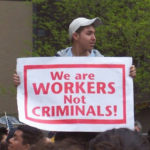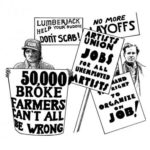- From The Editors
- Letters
- Special Section on Asia and Africa
- Our Workers in Bangladesh: Toiling for $50 Per Month, Vasja Badalič
- Long Live the Tyrant! The Myth of Benign Sanctions, Ali Fathollah-Nejad
- Turkey, the Erdoğan Government and the Left Today: An Interview with Oğuzhan Müftüoğlu, Dan La Botz
- Mali: A Neocolonial Operation under a Humanitarian Camouflage, Jean Batou
- Interview with South African Activist Mazibuko Jara, Jack Gerson
- Jewish Alternatives To Zionism, Bennett Muraskin
- Imagining a New Political Landscape in Israel and Palestine, Patrick O. Strickland
- Removing the Stigma of Past Incarceration, Bill Mosley
- Tip of the Iceberg, Robert Stout
- Collective Homeownership, Simon Swartzman
- Interview with Colombian Activist Ricardo Esquiva, Dan La Botz
- On the 70th Anniversary of Victor Serge’s Memoirs Of A Revolutionary, Richard Greeman
- The Spark Lights Up in Action: Rosa Luxemburg’s Philosophy of Praxis, Michael Löwy
- Globalization and Migration — A Human Rights Approach, David Bacon
- HUAC and the Red Trilogy of World War II, Dan Georgakas
- Bosnia and Herzegovina: The Left and the Forgotten Partition, Creede Newton
- Continental Congress of Workers and Farmers, 1933, Herman Benson
- Book Reviews
- Kenzo Shibata, Review of Lois Weiner, The Future of Our Schools
- George Fish, Review of Michael Heinrich, An Introduction to the Three Volumes of Karl Marx’s Capital and Wayne Price, The Value of Radical Theory: An Anarchist Introduction to Marx’s Critique of Political Economy
- Lily Murphy, Review of Dan Boyle, Without Power or Glory
- Laurie Calhoun, Review of Medea Benjamin, Drone Warfare: Killing by Remote Control
- Bill Crane, Review of Barbara Garson, Down the Up Escalator: How the 99 Percent Live in the Great Recession
- Peter Bratsis, Review of Costas Panayotakis, Remaking Scarcity: From Capitalist Inefficiency to Economic Democracy
- Philip Louro, Review of John Bellamy Foster and Robert W. Mcchesney, The Endless Crisis
- Words and Pictures
- Kent Worcester, Laura Gray Graphics
New Politics Vol. XIV No. 3, Whole Number 55
In this issue:
Our Workers in Bangladesh
In Bangladesh, the transnational corporations’ production system regressed into one of its most brutal manifestations. Most safeguards that could prevent or at least mitigate the exploitation of workers have been eliminated. While capital enjoys complete freedom, the working class, shackled by oppressive labor laws and a ruthless repressive apparatus, is struggling for bare survival.
The Myth of Benign Sanctions

They aim to bring recalcitrant tyrants to their senses, to put an end to their external as well as internal malefaction. With surgical precision, they pull the noose ever closer around the tyrant’s neck, so that in hopeless despair he is compelled to behave reasonably in foreign affairs while, enfeebled, he lifts his bloodied hands from the throat of the oppressed people. It is a morally justified decapitation of evil, the salutary removal of a swelling tumor.
Turkey, the Erdogan Government and the Left Today
(Translation By Özlem İlyas Tolunay; Turkish version here.)
Oğuzhan Müftüoğlu was born in Anamur, Turkey in 1944. He joined the Revolutionary Youth (Dev-Genç) movement while he was a law student at Ankara University during the 1960s.
Mali: A Neo-Colonial Operation Disguised as an Anti-Terrorist Intervention*

Translated by Dan La Botz
In mid-January of this year France invaded Mali, a former French colony that sits in the middle of what was once the enormous French empire in Africa that stretched from Algeria to the Congo and from the Ivory Coast to the Sudan. The French government argued that its invasion of its former colony was an anti-terrorist and humanitarian intervention to prevent radical Salafist Muslims from taking the capital of Bamako and succeeding in taking control of the country.
South Africa: The Marikana Massacre and the New Wave of Workers’ Struggle
I’m here with Mazibuko Jara. Mazibuko is from the Democratic Left Front of South Africa. He was spokesperson for the South African Communist Party and the deputy secretary for the Young Communist League, back a decade and more ago. He is one of the co-founders of Amandla magazine and the Democratic Left Front, and they’ve been extremely active in the support for the Marikana miners and for South African farmworkers, and elsewhere. We’ll talk about this and more in this interview. Today is Sunday, Dec 2, 2012.
Jewish Alternatives to Zionism

Zionism is but one of many ideologies/movements that have competed for the loyalty of Jews as the guarantor of their freedom and security. The fact that it achieved success with the establishment of Israel in 1948 causes people to forget that its success was not pre-ordained. Further, no one can deny that it has come with a heavy cost in both Jewish and Arab lives. From a historic perspective, it may be worth examining other visions to secure a Jewish future. Every road not taken need not be a dead end.
Imagining a New Political Landscape in Israel and Palestine
Ramallah. In November 2012, the United Nations General Assembly approved a resolution to upgrade Palestine to a “nonmember observer state”. The usual suspects—Israel, their American financers, and a few of their mutual allies—voted against the resolution, but it overwhelmingly passed.
Removing the Stigma of Past Incarceration: “Ban the Box” Laws

Picture yourself going into a job interview, as many readers of this publication no doubt recently have done or will do in the future. You have a solid record of experience relevant to the position, but you will still need to stand out in a large field of candidates for the same job. Imagine your employer asking the usual questions about your background and suitability for the job, which you handle with ease. Then comes the question: “You checked the ‘yes’ box for the question on whether you have been convicted of a crime.
Tip of the Iceberg
The roll of names was impressive: Iñaki García, María Francisca Ize-Charrin, Louise Arbour, Giovanni di Girolamo, Erika Mann, Alberto Ignacio Glender, Alexander Koeln, Teresa Ávila, Eva Lichtenberger — all with impressive titles and extensive backgrounds in government, jurisprudence, and human rights.
Collective Homeownership

As the housing crisis plows through our neighborhoods, it leaves behind the same bleak scenes. The former owner separated from her home, her neighbors, her children’s schools, and possibly her children themselves ― a tragedy anonymous to millions of analogous others across the country. Neighbors staring down the dead, wall-eyed windows of the vacant homes on their block and seeing the promise of rising crime and falling attendance at block parties.
After 65 Years—Will Peace Finally Come to Colombia?
Colombia has the longest history of ongoing political violence in Latin America. Some date the beginning as April 9, 1948 when Jorge Eliécer Gaitán, the Liberal Party’s presidential candidate, was assassinated, leading to the Bogotazo riots that took 5,000 lives and unleashed a civil war between Conservatives on the one hand and the Liberals and Communists on the other. Between 1948 and 1958 that war took 200,000 more lives, injured hundreds of thousands more, and displaced perhaps a million.
On the 70th Anniversary of Victor Serge’s Memoirs of a Revolutionary
Seventy years ago, Victor Serge put the finishing touches on his masterpiece — Memoirs of a Revolutionary: 1903-1941 — which he (correctly) considered “unpublishable” in his lifetime. On February 28, 1943 he wrote the following entry in one of his Carnets (Notebooks), which recently came to light in Mexico and were published for the first time in France in 2012.[1]
Zündende Funke: The Spark Lights Up in Action

There seems to exist a secret complicity between the rediscovery of Rosa Luxemburg and rebellious times. The last period when her life and writings raised much interest was in the 1960s and 70s, during the “street-fighting years” (Tariq Ali’s expression). Could the recent publication of several of her works, in many parts of the world, be the sign of a new “critical” epoch? In the English speaking world, the good news is the project of publishing The Complete Works of Rosa Luxemburg in fourteen volumes, five of which only with her correspondence.
Globalization and Migration

We need an immigration policy based on human, civil, and labor rights, which looks at the reasons why people come to the United States and how we can end the criminalization of their status and work. While proposals from Congress and the administration have started the debate over the need for change in our immigration policy, they are not only too limited and ignore the global nature of migration, but they will actually make the problem of criminalization much worse. We need a better alternative.
HUAC and the Red Trilogy of World War II
ONE OF THE CONCERNS that supposedly brought the House Committee on Un-American Activities (HUAC) to Hollywood was that the Communist Party-U.S.A. had quietly infiltrated the film industry. Members of the CP and fellow travelers were charged with having surreptitiously inserted ideological messages into mainstream American cinema. Screenwriters were considered particularly culpable. Among the primary HUAC concerns was what it considered grossly flattering and inaccurate depictions of the Soviet Union.
Bosnia and Herzegovina: The Left and the Forgotten Partition
On January 9, 1992, as the Socialist Federal Republic of Yugoslavia splintered, the Serbian citizens of Bosnia and Herzegovina (BiH) announced the independence of the Republika Srpska (RS). The precipitous announcement of Serbian autonomy could be considered the diplomatic origin of the RS quest to ethnically cleanse Bosnia, thereby making it suitable for inclusion in a Greater Serbia as was the goal of the RS’s first president, Radovan Karadžić.
The Continental Congress of Workers and Farmers,1933

The high point of social radicalism in America was the Continental Congress of Workers and Farmers for Economic Reconstruction in Washington, DC on May 6 and 7, 1933. Delegates came from around the country in response to the call from a few hundred prominent established leaders of unions, farmers’ organizations, cooperatives, the Socialist Party, student groups, organizations of the unemployed. Signers of the call came from thirty-one states and the District of Columbia. Every organization invited to attend was asked to send two representatives.
No Movement, No Justice!
Most of the current literature on the international education crisis gives little to no big-picture context for planning a fight back. Given the parochial view of most popular education authors, many earnest, well-intentioned proposals for fight back are written within parameters the ruling class tolerates.
Marxist Political Economy in a Contemporary Vein

The continuing world recession that has now dragged on since late 2007, with no sign of abating, has renewed interest in Marx’s critique of capitalism. So much so that even respectably “mainstream” TIME.com now writes:
"Karl Marx was supposed to be dead and buried. With the collapse of the Soviet Union and China’s Great Leap Forward into capitalism, communism faded into the quaint backdrop of James Bond movies or the deviant mantra of Kim Jong Un….
From a Dream to a Nightmare
It was supposed to mark the beginning of a new era in Irish politics. The Green Party entered into a coalition government with Fianna Fail in 2007 bringing with it the ideas of a new greener economy and all the hopes and aspirations of environmentalists, but instead their time in power turned out like a comedic tragedy.
Drone Dread

I admire Medea Benjamin, co-founder of the activist group CODE PINK, which has staged anti-war protests and promoted victims’ rights all over the world. Her recently published book, Drone Warfare: Killing by Remote Control, focuses specifically on the relatively new phenomenon in military history of weaponized unmanned aerial vehicles or UAVs, the most common of which is the Predator drone. Having conducted a thorough—and dangerous—fact-finding mission to learn how U.S.
The Crisis Upside Down
The financial crisis that began in 2008 has accelerated many economic trends already at work in the neoliberal period of capitalist development. Wages continue to decline, the class struggle bursts out in contradictory fits and starts at the same time as the societal value of work, and therefore the people who do it, continues to depreciate.
Remake Scarcity or Desire?
Costas Panayotakis’ Remaking Scarcity is a bold attempt to combine the analysis of the ecological limits of capitalism with the call for “economic democracy.” A work that is both topical (with frequent discussion of contemporary developments such as the Arab Spring and the crisis in Greece) and scholarly, the book unfolds as a series of overlapping discussions on four key themes: scarcity, inequality, democracy, and ecological crisis.
Boldly Going Nowhere
The financial collapse of 2008 was a sudden, shrill alarm that abruptly exposed neo-liberalism to be nothing more than a fool’s paradise. For decades, many Americans marched to the hypnotic music of free market fantasy and willfully ignored the low, droning crescendo of social decay. The hypnotic melody of constant growth, full employment, low taxation, and rugged entrepreneurialism muffled the warning sirens that had gone off around them.
Sculptor, Painter, and Cartoonist: Laura Gray
The Marxists Internet Archive project recently uploaded the complete run of Labor Action, published by the Workers Party and its successor, the Independent Socialist League, between 1940 and 1958, as well as the Militant, published by the Socialist Workers Party.
Bizarre Assertions
I read New Politics because it provides an in depth socialist perspective on politics available nowhere else, but some of your contributors make bizarre assertions.

